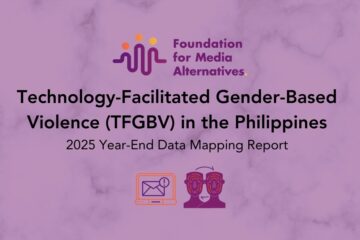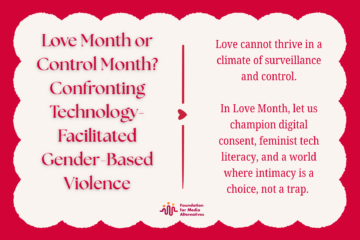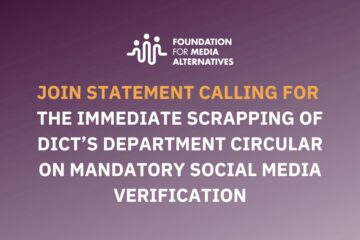GenderScoop: Safer internet? Combatting online persecution of women, exploitation of girls, and the dangers of SIM registration

GenderScoop is a monthly digest on gender & ICT in the Philippines
February 2022 scoop: Weaponization of ICT against women and girls, initiatives for safer and inclusive internet, and clamor regarding the SIM card registration bill
What we gather this month:
State initiatives. Policy efforts on recognizing online dimension of gender-based violence (GBV) were welcomed. The government rolled out initiatives to surface nuances on women’s access and use of ICT.
- Passage of Senate bill to strengthen anti-trafficking law a ‘welcome development’ to IACAT’s efforts
- DOJ lauds Senate nod on expanded anti-human trafficking law
- House OKs bill prohibiting all forms of child sex abuse
- PSA-6 to conduct WIDI survey
- PSA-RSSO 8 to conduct the first national survey on ICT focused on women and girls

Safer Internet Day. “The Presidential Proclamation No. 417 declares every second Tuesday of February every year as ‘Safer Internet Day for Children Philippines’ which is celebrated as a call to action to promote better and safer internet use for everyone. The day offers opportunity to highlight positive uses of technology and to explore the role we all play in helping to create a better and safer online community” (DILG).
- SaferKidsPH statement on the approval of Senate Bill No. 2209 on the protection of children against online sexual abuse and exploitation
- DSWD leads Safer Internet Day for Children 2022
- Plan International Philippines and Twitter launches the #NotForSale: A safer twitter campaign and resource hub
- #StopOnlineChildAbuse: Globe marks Safer Internet Day with webinar on online child safety and protection
- Public urged to cultivate culture vs. kids’ online sexual exploitation
- #UndoFilter: Converge, Stairway Foundation Partner to Protect Children from Online Abuse

Online GBV. Women on the public eye are targeted by online harassment and sexual attacks. Non-consensual use and sharing of intimate images also threaten women and girls.
- YouTube takes down channels spreading fake news vs Sharon, Kiko Pangilinan
- Inka Magnaye draws flak from Quiboloy supporters, eyes legal action
- Journalist Raissa Robles sues Gadon for libel, and Safe Space violation
- Global study analyzing sexual harassment in newsrooms released by WAN-Ifra Women in News
- Plea bargaining results in conviction of 2 trafficking suspects
- Foreign national arrested for “spreading” nude photos and videos of minor online
- Man, 19, nabbed for ‘blackmailing’ girl
| Check out: – Take Back the Tech! platform for mapping OGBV in the Philippines – Take Back the Tech! Philippines – Women’s Rights Online – Philippines |
How was your Valentine’s Day? “Base sa datos ng Kaspersky, isa sa bawat 2 o halos kalahati sa 1,600 na survey respondents nila ang nawalan ng pera dahil sa love scam.” —
Love scam cases sa Pinas posibleng underreported dahil sa ‘hiya’. Iba pa: Dating online? Tips from a cybersecurity fir

Elections. The Philippine elections are upcoming and ICT plays a critical role for women voters and in pressing for women’s rights.
- BPO Partylist vows to create measures vs. phishing, hacking
- Comelec hopes Congress OKs online voting for Filipinos overseas
- Hontiveros vows to support bill vs fake news peddlers, ‘troll farms’ using taxpayer’s funds
- Leni app launched for Robredo’s volunteer-driven campaign

SIM card registration bill. Will the policy actually curb crime as legislators say? Civil societies shed light on the bill’s threat to fundamental human rights.
- ‘Real name’ social media registration seen to risk free speech, privacy and identity
- SIM bill a threat to privacy — experts
- Globe calls for stronger cybercrime law, ‘rational’ enforcement of SIM registration
- Drilon defends ‘anti-troll’ provision in SIM card registration bill
Other scoop. We aren’t sure where to pin these but you might still be interested to check them out:
- Kaspersky: PH globally ranks 4th most targeted by web threats in 2021
- Quiboloy’s SMNI fuels disinformation, online attacks on gov’t critics
- Development Action on Women Network (DAWN) looks into reintegration paths of pandemic-hit women migrant workers
Beyond the Philippines. The Internet is boundless. Here are reads this month from across the world that may affect how we look at gender & ICT issues in the Philippines:
- TikTok is banning misgendering, deadnaming, and content promoting disordered eating
- How YouTube facilitates the persecution of TikTok women in Egypt
- Community radio enabling women’s empowerment in remote communities of India
- As Facebook plans the metaverse, it struggles to combat harassment in VR

protect fundamental human rights!
- The theory that SIM card registration is a boon for law enforcement has been consistently debunked across jurisdictions.
- The potential for abuse and function creep is high, especially when it comes to the use of the registration information for surveillance.
- The mandatory registration of social media accounts prevents internet users from exercising their right to anonymity, and, for some, even their ability to express themselves and freely associate with others.
- The measure imposes unnecessary burden on mobile phone users and third-party resellers, which consist mainly of small businesses.
- The proposal seeks to establish another massive database that immediately presents itself as a major security risk.
This month’s Feminist Principle of the Internet (FPI)
Did you know that women are 21% less likely to be online than men? This gap rises to 52% in the world’s least developed countries. The principle of access presses that more women and queer persons must be able to enjoy universal, acceptable, affordable, unconditional, open, meaningful and equal access to the internet. Why make a feminist internet? >

Maraming salamat!



0 Comments